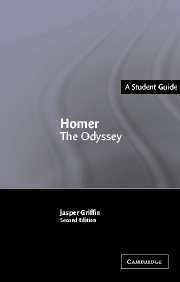3 - The Odyssey and after
Published online by Cambridge University Press: 05 June 2012
Summary
The after-life of the Odyssey
The two Homeric poems were decisive for the whole course of Greek literature. No less important than the fact that two such masterpieces stood at the very beginning of that literature was the fact that they never went out of fashion or ceased to be enjoyed. That is very unusual: poems like the Song of Roland, the Nibelungenlied, or Beowulf, usually become old fashioned, cease to be heard or read, and are rediscovered, if they are lucky, by later scholars. In Greece the effect of Iliad and Odyssey was unbroken.
The greatest of the descendants of the epic was Athenian tragedy. Plato called Homer ‘the first and greatest of tragic poets’, and the people of the epic reappear as the heroes and heroines of the Athenian drama. Odysseus is a character in the Ajax and Philoctetes of Sophocles (a good character in the former, a bad one in the latter), and in the Hecuba of Euripides; he is much spoken of in Euripides' Trojan Women and Iphigeneia in Aulis. Generally speaking tragedy gives him a bad press, presenting him as unscrupulous and deceitful. The conscious seeking after the high style also owed much to Homer; no less important is the fact that Homeric epic contains so much dialogue, often lively and passionate, the very stuff of tragedy.
- Type
- Chapter
- Information
- Homer: The Odyssey , pp. 95 - 100Publisher: Cambridge University PressPrint publication year: 2003

